Imagine an AI-powered chatbot that goes beyond answering your customers' questions to take action, such as canceling orders, handling returns, troubleshooting issues, and more. What a relief that would be, especially if you manage hundreds of interactions every day!
This level of automation is no longer just a vision. It’s already here in the form of AI agents—a major leap beyond traditional chatbots. The potential is enormous: Gartner predicts AI agents will handle up to 80% of customer issues by 2029, slashing operational costs by a third.
In this article, we’ll dive into agentic AI and how your business can benefit from it. We’ll also guide you on how to choose the right solution to unlock its full potential and will explore the top solutions available on the market, including Zendesk AI Agents and their alternatives.
What Is an AI Agent?
Unlike traditional chatbots, AI agents are powered by large language models (LLMs), which allows them to understand and communicate in natural language. Besides, they are more independent: once you set a goal, an AI agent can create a plan and take the necessary steps on its own, which makes them ideal for managing complex, multi-step tasks with minimal input from you.
AI agents typically connect with third-party tools and data sources. For example, a customer service agent can update customer records in your CRM during a support interaction. Finally, they continuously learn and improve, delivering smarter and more efficient results over time.
Let’s see what it looks like in action.
How Does an AI Agent Work?
Imagine a customer visiting an online retailer’s website and starting a chat to return an item from a previous purchase. The AI agent recognizes this as a request, checks the relevant order information, and guides the customer through the return process. If the customer asks something beyond its scope, the agent smoothly hands off the conversation to a human agent, passing along the context so the customer doesn’t have to start over.
Throughout the interaction, the AI agent autonomously updates records, manages support tickets, and learns from the conversation to deliver even better responses next time.
And this is just one example of an AI agent.
Types of AI Agents
AI agents come in many forms and shapes. Here are the main varieties, each bringing unique strengths to the table:
AI agents for customer support
AI agents for customer support are designed to provide instant, 24/7 support across various channels, including email, chat, social media, and messengers. Zendesk AI Agents, Freshworks’ Freddy AI Agents, and Intercom’s Fin are among the best-known customer service AI agents.
IT support agents
AI agents in IT help desks can troubleshoot technical issues, reset passwords, monitor system health, and guide users through setup or troubleshooting steps, freeing up IT staff for more complex challenges.
Sales development representatives (SDRs)
These AI agents qualify leads, schedule meetings, and nurture prospects through the sales funnel. By analyzing customer data and interactions, they personalize outreach, answer product questions, and ensure that sales teams focus on the most promising opportunities.
Shopping assistants
AI shopping assistants guide customers through product selections, answer questions about features or availability, and help with checkout. They can recommend products based on browsing history and preferences, making online shopping more personalized.
AI agents for marketing teams
Marketing-focused AI agents help with campaign management, content creation, audience segmentation, and performance analytics. They automate repetitive marketing tasks, suggest optimizations, and deliver insights to maximize campaign impact.
Knowledge management agents
These agents organize, update, and retrieve information from vast knowledge bases. They ensure employees and customers have quick access to accurate, up-to-date information and can identify content gaps or outdated articles, recommending updates as needed.
How Can Zendesk AI Agents and Other Agentic AI Solutions Help Your Business?
AI agents deliver immediate, 24/7 support — a standard expectation among customers. Businesses using Lyro, Tidio’s AI agent, have seen response times drop by as much as 97%. This always-on availability and faster response times boost customer satisfaction.
Automating routine interactions with AI agents not just makes your customers happier; it drives efficiency and reduces costs. Solutions like Zendesk AI Agents can automate up to 80% of customer interactions, while Bank of America’s Erica helped cut customer service costs by 10%. By handling repetitive tasks, AI agents also reduce burnout among customer support teams.
On top of that, AI agents make it easy to scale support as your business grows. For instance, TaskRabit leveraged an AI agent to manage a 60% increase in ticket volume during international expansion. This demonstrates how AI can help businesses handle surges in demand without sacrificing service quality.
It’s important to remember, though, that getting these benefits takes smart, strategic use of AI agents.
Best Practices for Using Customer Service AI Agents Across Industries
Recent research by LangChain shows that customer service is the third most popular area for AI agent adoption — right after research and summarization, and personal productivity. Here are some of the most impactful use cases of AI agents for customer support by sector:
E-commerce & retail
- Order tracking. Instantly provide customers with real-time order status, shipping information, and delivery estimates.
- Returns and exchanges. Guide customers through return processes, issue return labels, and update inventory automatically.
- Personalized recommendations. Analyze customer preferences and browsing history to suggest relevant products, boosting sales and engagement.
- Answering FAQs. Handle high volumes of routine questions about products, policies, and procedures 24/7.
Healthcare
- Appointment scheduling. Automate booking, reminders, and cancellations.
- Medication and treatment reminders. Send timely notifications and answer questions about prescriptions or care plans.
- Symptom checking and triage. Provide initial guidance based on symptoms and direct patients to the appropriate care or specialist.
- Insurance and billing support. Clarify coverage, process claims, and answer billing questions.
Finance and banking
- Account management. Help customers check balances, review transactions, and update personal details.
- Fraud detection. Monitor account activity, flag suspicious transactions, and notify customers in real time.
- Automated loan and credit applications. Guide users through application processes and provide instant eligibility feedback.
- Personalized financial advice. Offer tailored tips and product recommendations based on customer data.
Travel and hospitality
- Booking and reservations. Automate flight, hotel, or activity bookings, and manage changes or cancellations.
- Travel updates. Provide real-time alerts on delays, gate changes, or itinerary adjustments.
- Personalized itinerary suggestions. Recommend activities, dining, or upgrades based on traveler preferences.
- Customer feedback collection. Prompt guests to leave reviews and analyze the feedback to improve service.
Telecommunications
- Technical troubleshooting. Guide users through device setup, connectivity issues, and service outages.
- Billing and plan management. Answer questions about bills, process payments, and recommend plan upgrades.
- Service requests. Automate tasks like SIM activation, number portability, and service renewals.
- Proactive support. Monitor usage and proactively offer solutions or upgrades based on customer patterns.
The Top AI Agents for Customer Support: Zendesk AI Agents and Others
When it comes to adopting agentic AI, you have two main options: building a solution in-house or using a third-party provider. To make the best choice, we recommend exploring what’s available on the market first.
Zendesk AI Agents
Zendesk AI Agents are AI-powered bots designed to automate a wide range of customer and employee service requests across chat, email, social, and more. Leveraging advanced generative AI models like GPT-4o, they deliver context-aware, multi-turn conversations and can act on your behalf through APIs.
Zendesk AI Agents support 79 languages, offer robust analytics, and are ready to deploy in minutes — no extensive training required. You remain in control with conversation flows that guide the agent’s actions for specific use cases and hybrid flows that blend scripted steps with generative AI for greater flexibility.
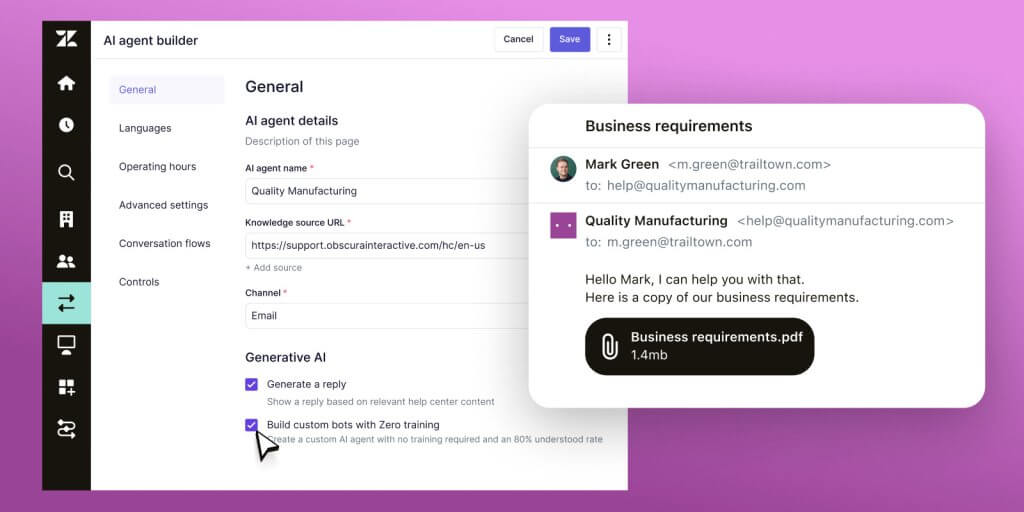
Source: Zendesk
When it comes to the pricing of Zendesk AI Agents, they are available as part of all Zendesk Customer Service Suite plans, with prices ranging from $19 to $115 per seat/month, or as an add-on with enhanced features and API integrations for connecting with other help desk platforms.
Freshworks AI (Freddy AI)
Freddy AI Agent is one of the most popular alternatives to Zendesk AI Agents. The GenAI-powered chatbot from Freshworks handles support requests across web, email, social media, Slack, and Microsoft Teams.
Easy to set up, Freddy quickly learns from your company’s knowledge base — including public links and internal documents — adapts to user needs, understands context, and delivers hyper-personalized service in multiple languages. It also summarizes interactions, suggests next steps, and provides actionable insights to enhance service quality.
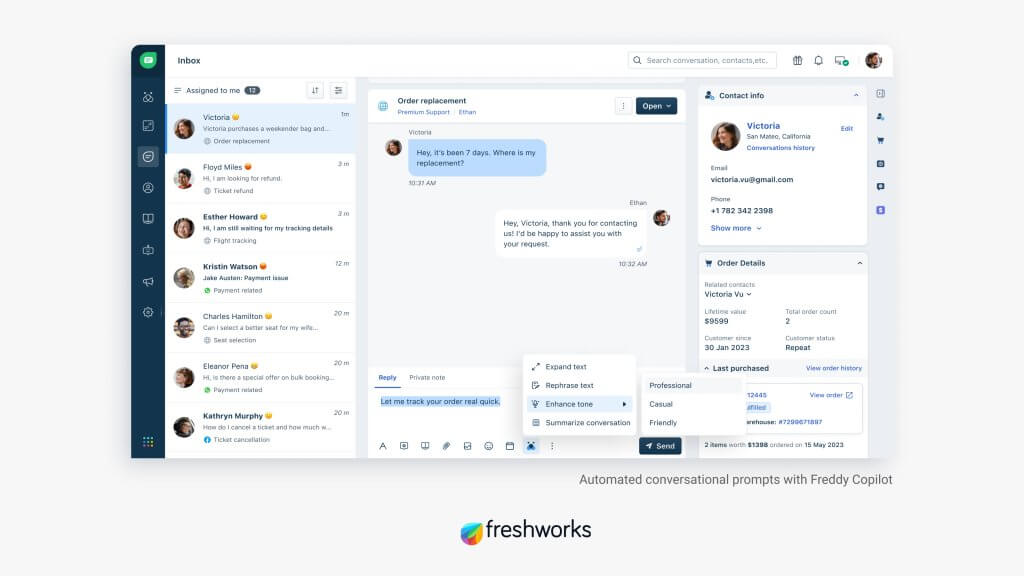
Source: Freshworks
Freddy AI Agent is available with Freshdesk or Freshchat, starting at the Pro plan ($49 per user/month) or the Growth plan ($19 per user/month). Both options cover the first 500 sessions. Additional sessions are priced at $100 per 1,000.
Intercom: Fin AI Agent
Fin AI Agent is a GenAI-powered service bot from Intercom that delivers human-like support across email, live chat, phone, socials, SMS, WhatsApp, and Slack. It draws accurate responses from your knowledge base, PDFs, internal sources, and external URLs.
Fin adapts to your brand’s tone and support workflows, understands 45 languages, tailors responses by customer type, generates actionable analytics, and can perform tasks like canceling orders or updating billing details.
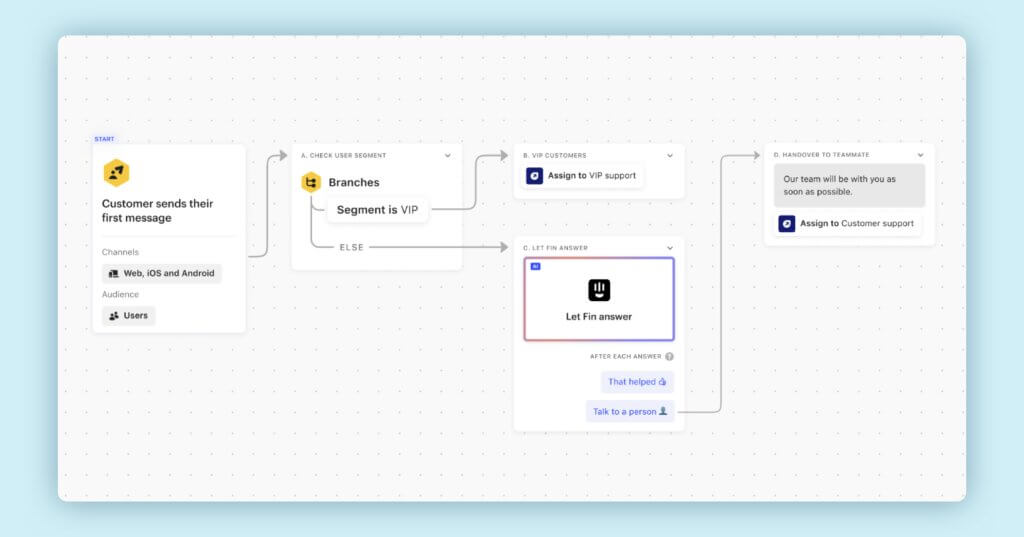
Source: Intercom
You can integrate Fin with your existing help desk for $0.99 per resolution or use this customer service AI agent within Intercom’s customer service platform at $0.99 per resolution (for the AI agent) plus platform fees starting at $29 per seat per month.
Salesforce: Agentforce Service Agent
Agentforce Service Agent is a generative AI customer service bot powered by Salesforce’s AI platform. The bot assists customers across web chat, email, SMS, and Slack 24/7. It resolves common inquiries quickly and accurately by tapping into trusted business data such as knowledge base articles, CRM records, and external sources.
Agentforce Service Agent understands context, supports multi-turn conversations, and can take action on behalf of your team: make reservations, open or update support cases, process orders, update account information, and more.
To use Agentforce Service Agent, simply subscribe to the Agentforce platform, priced at $2 per conversation.
HubSpot: Breeze Customer Agent
Breeze Customer Agent is HubSpot’s AI-powered support bot available across chat, WhatsApp, Facebook, email, and voice channels. It provides immediate answers to common questions like order status or password resets, routing more complex issues to human agents.
This is another example of an AI agent that learns from a variety of sources, including PDFs and knowledge base articles. It also continuously improves by learning from every interaction. Besides, it can spot knowledge gaps based on past interactions and work with the Knowledge Base Agent to fill them.
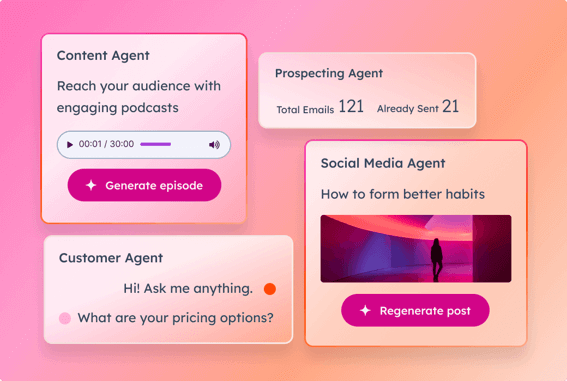
Source: HubSpot
The setup is quick and straightforward. While customization options are somewhat limited, you retain control over your agent’s traits and behavior. For example, you can assign your agent a personality, choosing between Friendly, Professional, Casual, Empathetic, or Witty.
Breeze Customer Agent is included with HubSpot’s Service Hub Professional and Enterprise plans.
Kustomer AI Agents
Kustomer’s AI Agent is designed to deliver fast, reliable support around the clock, meeting your customers wherever they are — whether it’s SMS, voice, chat, email, or messaging apps. With seamless handoffs, complex tasks can move effortlessly from AI Agent to human agent and back, ensuring every interaction is handled efficiently and with a personal touch.
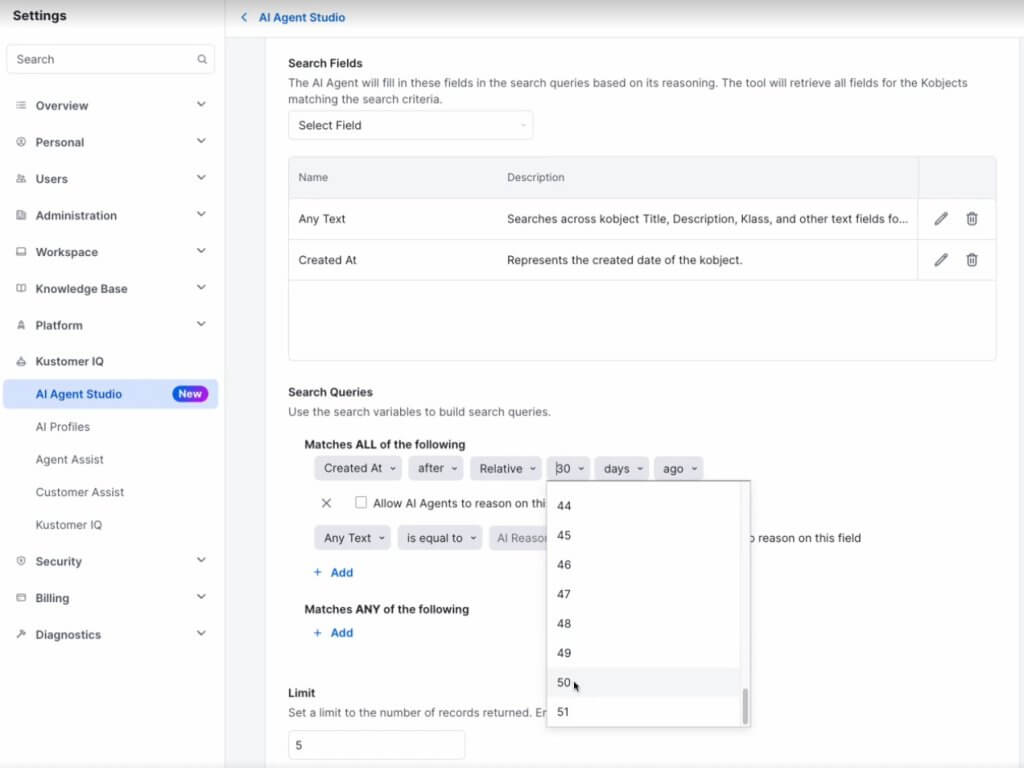
Source: Kustomer
You can customize your AI Agent’s voice and tone to authentically reflect your brand, creating a consistent and engaging customer experience. Available as an add-on to all Kustomer platform pricing plans, Kustomer’s AI Agent starts at just $0.60 per engaged conversation.
Tidio: Lyro
Lyro is Tidio’s customer support AI agent that assists customers across live chat, email, socials, and other channels.
Powered by Anthropic’s Claude large language model and Tidio’s proprietary AI, Lyro understands customer intent and responds using only your verified support content, including your help docs, FAQs, and up to 1,000 website pages. Easy to set up, Lyro can resolve most customer questions, automate tasks like checking order status or creating tickets, and handle multiple conversations simultaneously. The AI agent has been recognized for its ease of use, high resolution rates, and rapid response times (under six seconds).
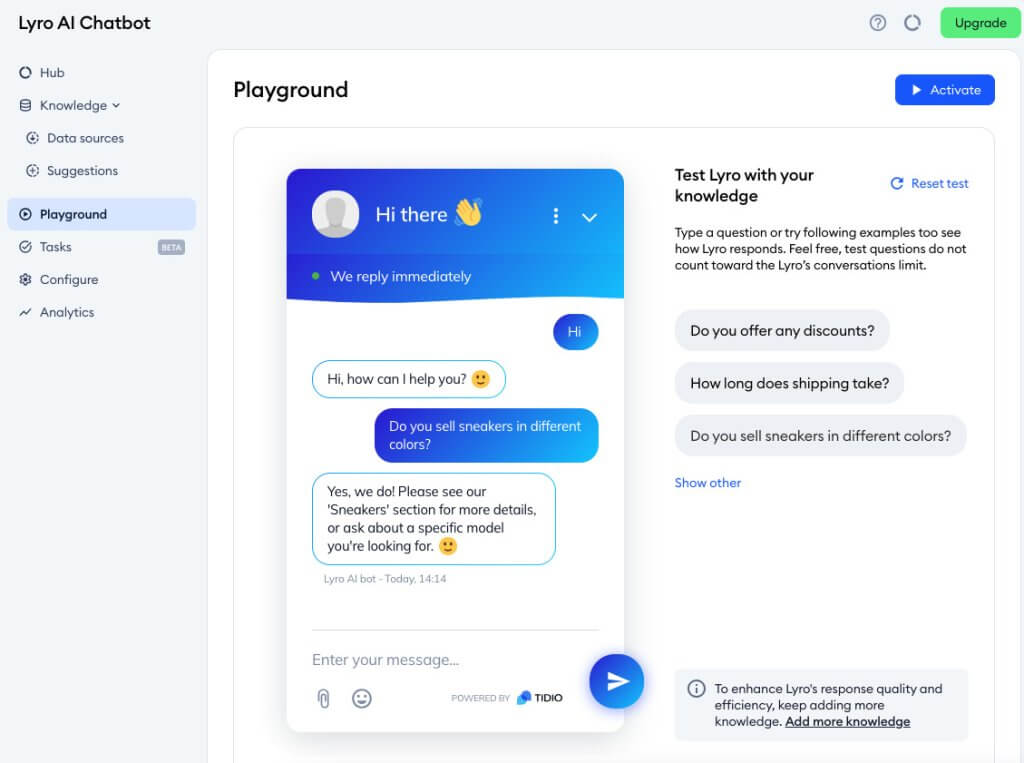
Source: Tidio
You can use Lyro directly in Tidio or integrate it with other help desk platforms. Every Tidio account includes 50 free Lyro conversations, with higher limits available on paid plans.
How to Сhoose the Right AI Agent
As these AI agent examples show, the customer support software market is full of innovative agentic AI solutions. So, how do you choose the right one for your business? Here are a few helpful tips:
- Analyze your support profile. Look closely at the types and volume of queries your customer support team receives, the channels your customers prefer (like chat, email, or social media), and the languages you need to support. This will help you narrow down the essential features your AI agent must have.
- Consider integrations. Many help desks offer built-in AI agents. Check your current platform — you might find that it includes everything you need, saving you the hassle of starting from scratch.
- Think about your industry needs. If you are, let’s say, in e-commerce, prioritize AI agents that integrate seamlessly with platforms like Shopify or Magento. Industry-specific compatibility can make a big difference in performance and ease of use.
- Don’t overlook compliance. If your business operates in a strictly regulated industry, ensure your chosen AI agent meets all necessary compliance and security standards.
Even if you’ve found a solution that works well, keep an eye on the market. AI technology evolves rapidly, and new tools may offer features or efficiencies worth considering down the line.
A Look at AI Agents in the Future
The latest breakthroughs in agentic AI show that these GenAI-powered assistants are quickly becoming more capable and autonomous. Today’s agentic AI doesn’t just respond to customer queries; it can plan, make decisions, and take independent action, marking a major leap beyond traditional chatbots.
These trends highlight how agentic AI is reshaping customer service, delivering smarter automation, greater efficiency, and a new standard of independence for digital assistants.
Final Thoughts
Agentic AI is steadily becoming the new standard for automating customer service interactions. If you haven’t integrated this technology into your support workflow yet, now is the perfect time to take action.
The market is filled with powerful, budget-friendly AI agents that are easy to deploy. In fact, there’s a good chance your current help desk platform already includes an AI agent, so you might not even need any additional setup.
Help Desk Migration is here to assist if you’re considering a change. We can seamlessly migrate your customer service data to a new platform equipped with advanced agentic AI features (like Zendesk AI Agents), helping you unlock the full potential of AI-driven support with minimal disruption.



